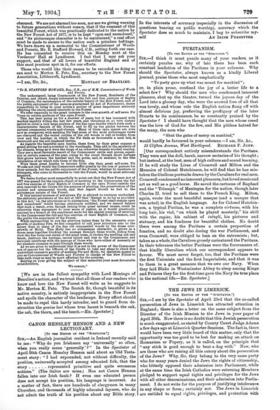PURITANISM.
[To THE EDITOR OP THE ..SPECTATOR-1 SIR,—I think it must puzzle many of your readers, as it certainly puzzles me, why of late there has been such constant laudation of the Puritans in your columns. Why should the Spectator, always known as a kindly Liberal journal, praise those who most emphatically
"To party gave up what was meant for mankind" ;
or, in plain prose, confined the joy of a better life to a select few ? Why should the men who condemned innocent pleasure, shut up the theatre, turned the joyous day of the Lord into a gloomy day, who were the avowed foes of all that was lovely, and whose rule the English nation flung off with almost delirious joy, preferring the profligacy of the later Stuarts to its continuance, be so constantly praised by the Spectator ? I should have thought that the men whose creed was the loVe of God for the few, and His pitiless hatred for the many, the men who
" Shut the gates of mercy on mankind," would hardly be favoured in your oolumns.—I am, Sir, &c.,
15 Clifton Avenue, West Hartlepool. RICHARD F. JIIPP.
[Our correspondent entirely misunderstands the Puritans. They were not the dull, harsh, narrow sectaries of his thought ; but instead, at the best, men of high culture and sound learning. If be will study the Lives of Cromwell and Milton and the Memoirs of Colonel Hutchinson, he will find that be has mis- taken the libellous portraits drawn by the Cavaliers for real men. Cromwell condemned no innocent pleasures, but loved music and art as well as a good horse. He saved the cartoons of Raphael and the " Triumph " of Mantegna for the nation, though later Charles II. tried to sell them to the French King. Milton, again, wrote the most beautiful masque (and a masque that was acted) in the English language. As for Colonel Hutchin- son, a typical Puritan, he was a complete virtuoso, with his long hair, his viol, "on which he played masterly," his skill with the rapier, his cabinet of intagli, his pictures and statuary, and his fondness for beautiful clothes. No doubt there were among the Puritans a certain proportion of fanatics, and no doubt also during the war Parliament, and even Cromwell, were obliged to lean on the extremists ; but, taken as a whole, the Cavaliers grossly caricatured the Puritans. In their tolerance the better Puritans were the forerunners of. that kindly liberalism which our correspondent appears to favour. We must never forget, too, that the Puritans were the first Unionists and the first Imperialists, and that it was to them in a great measure that we owe our Navy. When they laid Blake in Westminster Abbey to sleep among Kings and Princes they for the first time gave the Navy its true place in the national life.—En. Spectator.]










































 Previous page
Previous page